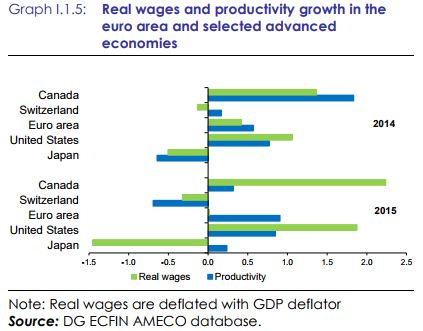
All rights reserved.
You may not copy, reproduce, republish, or otherwise use www.baltic-course.com content
in any way except for your own personal, non-commercial use.
Any other use of content requires the hyperlink to www.baltic-course.com.

Printed: 26.04.2024.
 PrintCommission’s report “Labour Market and Wage Developments in EU”
PrintCommission’s report “Labour Market and Wage Developments in EU”
In addition, the report shows that it has become easier for
unemployed people to find a job. On the other hand, more flexible working
arrangements have brought advantages to both firms and individuals, but have
led in some cases to a divide between workers holding different types of
contracts, with people in temporary employment and self-employment being less
well protected.
Background
The Labour Market and Wage
Developments in Europe report*) analyses
the labour market from a macroeconomic perspective. It provides an analysis of
recent employment and wage developments, looking at the euro area and the EU as
a whole in comparison with its global trading partners. Each edition includes a
thematic chapter that deepens the macro-economic analysis of a relevant issue.
Previous editions of the report can be found here.

The proposal for a European Pillar of Social
Rights, adopted by the Commission on 26 April 2017, sets out
20 key principles and rights to support fair and well-functioning labour
markets and welfare systems.
*) http://ec.europa.eu/social/main.jsp?catId=738&langId=en&pubId=8040&furtherPubs=yes
Commissioner for Employment, Social Affairs, Skills and
Labour Mobility, Marianne Thyssen, underlined that more people in Europe have
been able to find a job; the EU witnesses the highest employment level ever
recorded. The reason for this success is the EU states’ targeted policy
reforms. However, she added, there are further challenges: the member states
have to ensure fair working conditions and protection for all
workers, independent of their employment status.
On
the basis of the European Pillar of Social Rights, which was launched in April
2017, the Commission is working to modernise the rules on employment contracts
and social protection to achieve better working and living conditions among the
EU states.
The 2017 Labour Market and Wage Development Report shows
that in 2016, wages in the euro area rose by 1.2% and they increased in almost
all EU states: with comparatively low wage levels (such as the Baltics, Hungary
and Romania) recorded the highest increases. This means wages are converging
across Europe.
However, in many countries, the growth rate of wages is
still lower than expected based on the recent falls in unemployment. In
addition, in almost all EU states, wages of temporary workers are lower than
those of permanent workers, especially in the states where the share of
temporary employment is higher.
Delivering on the European Pillar of Social Rights, the
Commission presented a legislative proposal to improve work-life balance of
working parents and carers, and launched social partner
consultations to modernise the rules on labour contracts and
on access to social
protection for all. These initiatives could provide answers (if adopted)
to the challenges highlighted in this year's Labour Market and Wage
Developments in Europe report, such as labour market segmentation and lack of
protection of workers in non-standard forms of employment.
In the State of the Union address
(2017), President Juncker confirmed the Commission’s
commitment to move forward with the “Social Pillar” as an essential means to
assert European values and create a deeper and fairer EU. “If we want to avoid social
fragmentation, and social dumping in Europe, he said, then the EU states should
agree on the European Pillar of Social Rights as soon as possible and as the
latest at the Gothenburg summit in November”.
The Social Summit for Fair Jobs and Growth will take place
in Gothenburg, Sweden, on 17 November 2017; more information on the Summit sees:
https://www.socialsummit17.se/
Source: http://europa.eu/rapid/press-release_IP-17-3867_en.htm?locale=en,
and Latvian version: